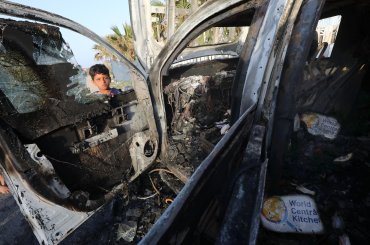Want to be inspired? Read Allison Deger’s moving account of how she went from being a college journalist to being a reporter in the West Bank, below.
Finally, we must emphasize that we are still in the middle of our summer fundraising campaign, and without your help we cannot continue and expand the work you value. As of today, donations received total $32,571 from 267 people. We have decided to extend the deadline beyond July 15, because we are still over $17,000 from our goal. Please give whatever you can, and tell others who value good journalism why you choose to support this work and how dollars and cents are transformed into truth-telling.
I got my first job as a journalist when I was 19 years old with Truthout, when I was still in college. I started out aggregating content and writing from the desk. Months later for my first assignment in the field, I covered a Veterans Day memorial.
It was during the heat of the Iraq war and Americans soldiers were silently dying in a conflict where the country was not sure what our armed forces were doing in the Middle East. Their remains were brought back to relatives in thin wooden caskets, often with little information about how loved ones lost their lives.
I was moved that day by the pain of the family members who placed flowers over the headstones. This reporting experience gave me the conviction that the impact of war, in Iraq and at home, needed coverage.
Since that first story I have reported on more than 50 funerals. I’ve covered Palestinians killed by the Israeli army, Israelis killed by Palestinians, Americans killed by police, and Europeans killed in acts of terror. I’m always impressed by the strength of people who must find ways to make sense of loss and carry on. Their stories are the human impact to politics.
My next position as a journalist was interning and then working for The Nation. My time with the magazine held tremendous value. It was a crash course in standards and ethics, and the process for moving an idea into an article. When I began working for Mondoweiss in 2011, I passed from researcher, fact-checker, and desk writer over the threshold into serving as a reporter. Mondoweiss gave me the opportunity to relocate to Israel/Palestine and become a correspondent at a much younger age that if I had taken a more traditional route in journalism. These four years with Mondoweiss have taught me to be an agile reporter.
I feel a sense of duty as a reporter to convey how an average person experiences events like war and protracted conflicts, because it is the sum of their experiences that builds national identities and often directs the political winds. This has led me to the belief that one cannot understand conflict without knowing its victims.
In Gaza during the summer war I met mothers trying to shield their children from a terrifying situation where they were trapped in a war zone without safe shelters. In the worst instances, people rode out waves of air strikes by holing up in construction sites, or even setting up camp in the corner of a public park.
I met one family whose arms were covered in blood after spending the morning burying their neighbors who perished the evening before. They spoke to me while waiting for a relative to arrive with a donkey cart to carry them away. Around us, the remains of some of their neighbors were still in the street, along with animal corpses. It was a level of devastation beyond the scope of anything I have seen.
I have the utmost respect for the people I interview, who courageously open their homes and hearts to me. Reporting in Israel/Palestine, I am always impressed with how generous people are to share their stories, even on what has amounted to the worst day in their life. I consider it a privilege to be able to document how one finds the strength of will to survive.
For previous messages in this campaign, including personal stories from Mondoweiss co-editor Adam Horowitz and editor-at-large Annie Robbins, click here.




Mrs Deger’s reporting has become the part of Mondoweiss that makes it unique, irreplaceable.
I agree completely, echinococcus !
Thank you, Allison Deger !
“one cannot understand conflict without knowing its victims”
We can carry that further, and say that injustice in Isra-Palestine exists *because* Jewish Israeli people are prevented from ever, ever knowing, or seeing, the victim. The apartheid state has created a complex web of physical and symbolic controls to ensure that.
We had Mark Braverman the other day (https://mondoweiss.mystagingwebsite.com/2015/07/time-jewish-reformation) saying how the problem is not the occupation or the rightist settlers, but Zionist ideology. Well, that was only half-right, because what we’re seeing is a feedback loop.
Zionism is a system that feeds back into itself through Israeli institutional segregation. It’s like a regenerative circuit.
If you want to eliminate Zionism and its injustices you need to eliminate segregation in the feedback loop.
I’ve noticed in reporting and in questions that people are asked—when we’re talking about a 1ss or 2ss, separation is a default setting. Transparent, invisible. Remember the debate between Munayyer and Beinart. Remember all our protests and all the organized struggles that we ever had –since the 1950s. Land Day. It was always about the expropriation of our land and rights but the one thing it was never about was the default setting of separation. At the very least people in the struggle have to be made conscious of their unconscious choices, even if these choices come out of legitimate worries.
I see the influence of Martha Gellhorn on this young correspondent. Or, maybe they just arrived at the same place. Idiots make political choices for the unfortunate residences of a conflict zone.
To understand conflicts, you must know those that suffer the results. It seems obvious, but the world leaders (the Idiots) always miss that most important lesson. “When will they ever learn?”
Stay safe Allison!!!
Well pointed Allison! Indeed It is not so difficult to understand why all the conflicts have ever been started. I am sure that all those world leaders fully understand what and why they do. As I read in one research paper found on trustessaywriting.com “The old men start wars, the young die”. Basics of humanity are forgotten and seem very misty.